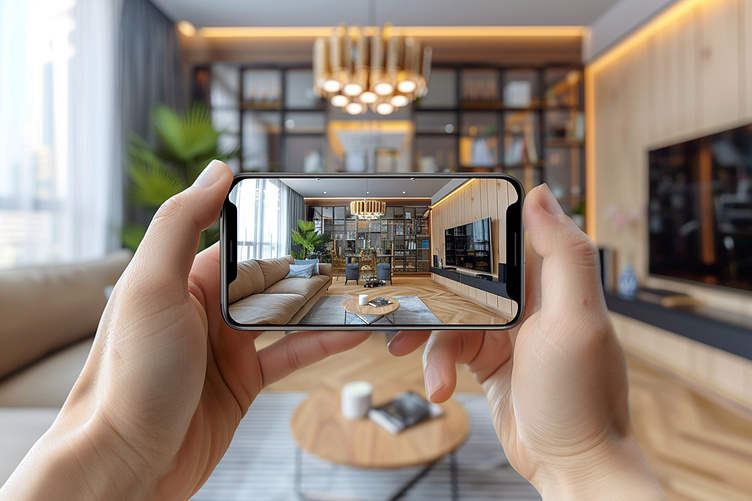Using AI to Virtually Stage Your Design Ideas
In the world of design, envisioning the final product before it's even built is like possessing a magical crystal ball. Thanks to advancements in artificial intelligence (AI), this magic is becoming reality. AI is revolutionizing the way design ideas are visualized and presented through virtual staging. Let's explore how AI is reshaping the design landscape, offering a glimpse into the future before the first brick is laid.
What is Virtual Design Staging?
Virtual staging is the process of digitally creating and visualizing interior and exterior spaces before any physical work begins. It involves placing virtual furniture, decor, and other elements within a space to provide a realistic representation of the final design. Traditionally, this process required considerable time, effort, and resources. However, AI is streamlining this process, making it more accessible and efficient.
The Role of AI in Virtual Staging
AI algorithms play a pivotal role in virtual staging by automating and enhancing various aspects of the design process. Here's how AI contributes to each stage:
1. Data Analysis and Prediction
Before diving into design, AI algorithms analyze vast amounts of data related to design trends, user preferences, and spatial configurations. By identifying patterns and predicting future trends, AI assists designers in making informed decisions, ensuring that their designs resonate with the target audience.
2. Automated Rendering
Rendering is a crucial step in virtual staging, as it transforms design concepts into photorealistic images or videos. AI-powered rendering tools leverage machine learning algorithms to automate this process, significantly reducing rendering times while maintaining high-quality results. This enables designers to iterate quickly and explore multiple design variations efficiently.
3. Content Creation
Creating content for virtual staging, such as 3D models and textures, can be time-consuming and labor-intensive. AI streamlines this process by generating realistic 3D models and textures based on input data and parameters provided by designers. This not only accelerates the content creation process but also ensures consistency and quality across different design projects.
4. Augmented Reality (AR) Integration
With the proliferation of AR technology, incorporating virtual designs into the physical world has become increasingly important. AI-powered AR platforms enable designers to overlay virtual designs onto real-world environments, allowing clients to experience and interact with the proposed designs in their actual spaces. This immersive experience enhances client engagement and facilitates better decision-making.
Benefits of AI-Powered Virtual Staging
The integration of AI into virtual staging offers numerous benefits for designers, clients, and stakeholders alike:
1. Cost Savings
Traditional staging methods often involve renting furniture and accessories, hiring photographers, and investing in physical staging setups. AI-powered virtual staging eliminates these expenses, making it a cost-effective alternative for showcasing design ideas.
2. Time Efficiency
AI automates many time-consuming tasks, such as data analysis, rendering, and content creation, enabling designers to work more efficiently and deliver projects in shorter time frames. This accelerated process enhances productivity and allows for faster project turnaround times.
3. Flexibility and Customization
Virtual staging offers unparalleled flexibility, allowing designers to experiment with different layouts, styles, and configurations without any physical constraints. AI-powered tools facilitate customization by generating personalized design solutions tailored to individual preferences and requirements.
4. Environmental Sustainability
By reducing the need for physical staging materials and resources, AI-powered virtual staging contributes to environmental sustainability. It minimizes waste and carbon emissions associated with traditional staging methods, aligning with the growing emphasis on eco-friendly design practices.
Challenges and Limitations
While AI has revolutionized virtual staging, it's not without its challenges and limitations:
1. Accuracy and Realism
Although AI-generated renderings can be incredibly realistic, they may sometimes lack the nuanced details and authenticity of physical spaces. Achieving photorealism requires ongoing refinement and fine-tuning of AI algorithms to accurately simulate real-world environments.
2. Technical Expertise
Effectively harnessing AI-powered virtual staging tools requires a certain level of technical expertise and familiarity with the underlying algorithms and technologies. Designers may need to undergo training or collaborate with AI specialists to leverage these tools effectively.
3. Ethical Considerations
AI raises ethical concerns related to data privacy, bias, and algorithmic transparency. Designers must ensure that AI algorithms are ethically developed and implemented to avoid perpetuating biases or compromising user privacy.
Conclusion
AI is transforming the way design ideas are brought to life through virtual staging. By leveraging AI algorithms for data analysis, rendering, content creation, and AR integration, designers can visualize and present their ideas with unprecedented realism and efficiency. While AI-powered virtual staging offers numerous benefits, it also poses challenges that must be addressed to realize its full potential. As AI continues to evolve, the future of design promises to be even more captivating and immersive, allowing us to see the possibilities before they're built.
Author Bio
Christie is a passionate and creative content marketing specialist at Styldod with a knack for crafting engaging and informative content that resonates with real estate agents and readers who are looking for content on interior and exterior design as well as design tech. She has a strong understanding of the real estate industry and is always up-to-date on the latest trends and best practices in the world of interiors, architecture and content marketing. Feel free to connect with Christie at christie@styldod.io for a friendly chat about making your work smarter for you.
